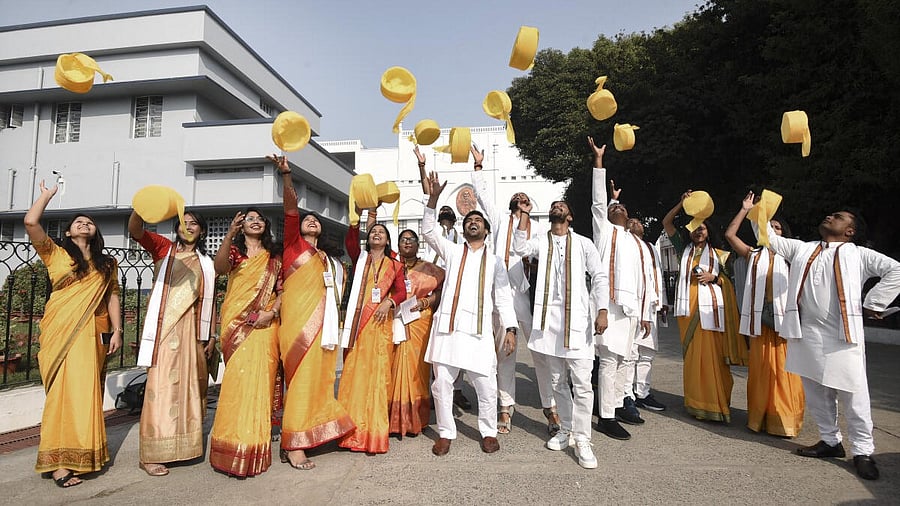
A convocation ceremony at Patna University where students are seen in Indian attire.
Credit: PTI Photo
Pictures of university convocations across India and many Commonwealth countries till date carry a colonial hangover—the traditional robes and mortarboards (cap) that students dress up in before they proceed to collect their certificates.
In India, the situation is slowly changing, at least when it comes to central government universities, many of whom are opting for traditional Indian attire instead of the legacy European outfit for convocations and other official ceremonies, as per a report by Indian Express.
This move away from the robes and caps mainly began after the University Grants Commission (UGC) issued an advisory in 2015, wherein it suggested that universities can opt for “handloom fabric for ceremonial dresses…for special occasions like convocation etc.” Some had already made the switch beforehand.
The advisory was in sync with Prime Minister Narendra Modi's call for “revival of handloom and improving earnings of the handloom weavers.”
This would “give a sense of pride of being Indian but also be more comfortable in the hot and humid weather,” the advisory had also said.
This was followed by two more similar notices in 2019 and 2024.
Recently, the Ministry of Health and Family Welfare has also asked medical institutions to adopt Indian attire for convocation ceremonies.
The publication carried out a review of several central government universities to reveal that around 76 per cent of them have now shed the dress code, a visual reminder of India's colonial past.
Around 70 colleges and universities, including most of the IITs and IIMs, have made the switch since the advisory was issued.
Among the 23 IITs in the country, all have switched to Indian attire barring IIT-Delhi. 18 of the IITs made the switch after the advisory was issued.
IIT-BHU, IIT-Jodhpur, IIT-Bombay, IIT-Gandhinagar and IIT-Guwahati had changed their dress codes to Indian attire even before the advisory, the publication revealed.
“Since the beginning, our convocation dress code included cream kurtas-pyjamas, with an option for saris, paired with a dark cream Gandhi (Nehru) jacket. The intent was to reflect Indian culture,” an IIT-BHU professor told IE.
Among the IIMs, 14 out of the 21 have shed the traditional attire, but not all have switched to Indian outfits. Among the 14 IIMs, seven have opted for formal Western attire along with a stole. The ones who still continue to follow the colonial dress code include IIM-Bangalore, IIM-Calcutta, IIM-Lucknow, IIM-Indore, IIM-Rohtak, IIM-Udaipur and IIM-Amritsar, the publication reported.
As universities shed their colonial dress code, the publication has revealed that out of the 48 institutions funded by the Ministry of Education, 34 have now opted for Indian attire. Four among these institutions had already switched to an Indian dress code before the 2015 advisory was passed, namely, Mahatma Gandhi Antarrashtriya Hindi Vishwavidyalaya (Maharashtra); Visva Bharati (West Bengal); Tezpur University (Assam); and Shri Lal Bahadur Shastri National Sanskrit University (New Delhi).
The first central university which responded to the advisory was the Benaras Hindu Univerisity (BHU). It switched to white kurta-pyjamas for men and sarees for women for its convocation ceremonies, along with a yellow uttariya and safas.
Among the institutions which have not transitioned to Indian attire yet, five—Rajiv Gandhi University (Arunachal Pradesh), North Eastern Hill University in Meghalaya, Nagaland University and Manipur University—told the publication that they are planning to make the change.
Nagaland University is considering switching to traditional Naga attire for its convocations.
This same decision by IIT-Jammu in 2021 had led to controversy after it planned to opt for Kashmiri culture-inspired attire for its convocation ceremony. Later, it chose white kurta-pyjamas.
There has also been detractors to this move. One central university official told the publication, “The entire concept of a convocation is Western, so why insist on an Indian dress code at all?”
In 2010, senior Congress leader Jairam Ramesh had grabbed headlines after he removed his convocation robe at a ceremony oragnised by the Indian Institute of Forest Management in Bhopal, wherein he called the attire a “barbaric colonial relic.”
